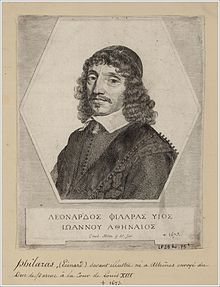Leonardos Philaras
Leonardos Philaras
(Λεονάρδος Φιλαρᾶς) | |
|---|---|
 Leonardos Philaras, 1658 | |
| Born | Leonardos Philaras
(Λεονάρδος Φιλαρᾶς) 1595 Greek independence, Greek literature, and Medicine |
| Literary movement | Renaissance, Greek literature, Medicine |
Leonardos Philaras (c. 1595 – 1673Greek independence.[7]

Biography
Leonardos Philaras was born of
See also
References
- ISBN 0-19-812889-4.)
The writer was a Greek, Leonard Philaras (or Villere, as he was known in France), an able diplomat and scholar, ambassador to the French court from the Duke of Parma
{{cite book}}: CS1 maint: multiple names: authors list (link - ISBN 0-7204-0510-6.
the Athenian Leonardus Philaras (d. 1673) who had visited England. Much more important for our purpose, however, were the Greeks who, fleeing from the Turks, came to italy and in much smaller numbers
- ISBN 0-19-812889-4.)
The writer was a Greek, Leonard Philaras (or Villere, as he was known in France), an able diplomat and scholar, ambassador to the French court from the Duke of Parma
{{cite book}}: CS1 maint: multiple names: authors list (link - ISBN 978-0-8207-0386-2.
In a letter to Athenian politician and scholar Leonard Philaras ( 1600?-1673), Milton movingly expresses his hope for a cure for his blindness.
- ISBN 1-85733-369-1.
The Athenian politician and medical doctor Leonardos Philaras (1595-1673) was an advisor to the French court, enjoying the patronage of Cardinal Richelieu
- ISBN 1-85733-369-1.
The Athenian politician and medical doctor Leonardos Philaras (1595-1673) was an advisor to the French court, enjoying the patronage of Cardinal Richelieu
- ISBN 0-313-30813-6.
Leonardos Filaras (1595-1673) devoted much of his career to coaxing Western European intellectuals to support Greek liberation. Two letters from Milton (1608-1674) attest Filaras's patriotic crusade.
- ISBN 0-395-80999-1.)
The letters to Philaras also tell us that Milton wished to be in touch with an Athenian Greek because of his love for the classical culture
{{cite book}}: CS1 maint: multiple names: authors list (link - ISBN 0-19-812889-4.)
The writer was a Greek, Leonard Philaras (or Villere, as he was known in France), an able diplomat and scholar, ambassador to the French court from the Duke of Parma
{{cite book}}: CS1 maint: multiple names: authors list (link - OCLC 298895450.
Writing, on the 28th of September, 1654, to his Greek friend Philaras, in answer to a letter which Philaras had sent him, giving him hope that his blindness
- ISBN 0-521-09799-1.)
Latin letter to Leonard Philaras, a Greek friend 1654
{{cite book}}: CS1 maint: multiple names: authors list (link - OCLC 3305912.
LEONARD PHILARAS or VILLERET (c. 1595-1673) Philaras was born in Athens of good family and spent his childhood there. His youth was passed in Rome, where he was educated, and his manhood
- ISBN 0-313-30813-6.
Leonardos Filaras (1595-1673) devoted much of his career to coaxing Western European intellectuals to support Greek liberation. Two letters from Milton (1608-1674) attest Filaras's patriotic crusade.
- )
External links
Wikimedia Commons has media related to Leonardos Philaras.
- Villani, Stefano (2020). "Villeré (Philaras), Leonardo". ISBN 978-8-81200032-6.
